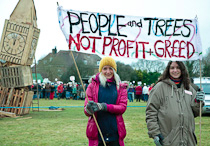This month saw plans announced for a new public woodland to mark the Queen’s Diamond Jubilee. The woodland will span an area of 460 acres in the National Forest in Leicestershire, and will provide a safe haven for wildlife. This, however, was a rare moment of celebration for our countryside and woodland in recent times. The proposed planning reforms put the places we love in danger, something which has concerned us greatly.
We at the National Trust believe that planning policy should provide the means to protect the things that are most important to our quality of life. Whether it is our local greens, nearby woods, or surrounding countryside. Planning should allow people to express what matters to them about their surrounding area, and provide the tools to keep the ‘spirit of place’ alive. Not by blocking all change, but by managing change and growth in ways that are sensitive to local needs and the public benefit.
When planning policy was initially created, emphasis was placed first and foremost upon how planning could serve the public’s needs. Since then this has been retained in one form or another up until the present day. But the Government’s proposed reforms seek to change this, tipping the balance towards the private sector and their priorities.
The current version of the National Planning Policy Framework (NPPF) uses the language of sustainability, but is worrying precisely because it will not deliver truly sustainable development in its current form. The three ‘pillars’ of the economy, society and environment are interconnected, and should always be considered together and with equal weight. But there is a clear expectation within the planning reforms that we move to a system where the default answer to development is ‘yes’ when it can be shown to deliver short-term economic growth.
We welcome David Cameron’s letter to us, outlining his desire to ensure that our countryside remains safe. It provides us with an assurance that the government cares. But we still need to see the consultation process through. We still need to make sure that the coalition acts on what it says, and ensures the planning laws work for people, the environment and the economy.
In its present form the NPPF has the potential to endanger our natural environment, but more importantly it will jeopardise the interests of local communities. And this is one of our major concerns that we need to see rectified during this period, where the government has the opportunity to stop, listen, and change paths.
If the planning reforms are to go through communities will possess fewer means to resist development proposals in their local areas, and this has been bluntly admitted by senior ministers and those who wrote the NPPF. Mr Rhodes, one of four expert advisers that helped to write the piece of regulation, stated in December that:
“[The NPPF is] not meant to be the opportunity for communities to resist development. It’s meant to be part of a strategy which encourages greater development.”
Furthermore, those local authorities without a published local plan will have planning applications automatically approved in their area. This is also the case where the local plan is “silent, intermediate, or where relevant policies are out of date”. At present 47% of local authorities do not have these local plans, whilst the other 53% possess plans, but these may be considered invalid by the Government as they were written before the NPPF. Ribble Valley Borough Council in Lancashire has already begun to experience this problem. It is currently in the process of writing its local plan, and this is due to be finished in the spring. But with no formal documentation as yet in place, it has been inundated with planning applications from developers aware of the loopholes in the regulation. Michael Ranson, Leader of the Council, stated that:
“…we are not allowed to delay or refuse applications on grounds of the imminence of our new local plan. Surely this cannot be right. It is no surprise that developers want to get approvals before the plan is accepted, because otherwise they would be bound by the wishes of the local people.”
And with the Government scrapping the ‘brownfield first approach’, which requires developers to build upon derelict land before Greenfield land, the problem is only going to be made worse. This is despite the fact that there are enough brownfield sites to build more than 1.2 million homes. It further emphasises the fact that there is not a lack of land available for housing stocks – the problem is that developers are not being encouraged to use it in the right way.
These reforms are already endangering Greenfield land, woodlands, and even greenbelt areas.
Although we have our concerns with the planning reforms, the National Trust does recognise the importance of development. Through our own experiences as a property developer we have learnt how difficult to manage the planning system can be, and so we welcome the simplification of this process. But the Government has clearly gone too far, placing excessive emphasis upon the short term economic benefits to be had from allowing developers to get their own way.
In fact the planning system is not as much of an obstacle as the government likes to claim. The percentage of planning applications approved has actually increased from 83% in 2004/5 to 85% in 2009/10. In addition, the UK’s eleven largest housing developers have planning permission to build 281,993 homes and own the land for another estimated 335,731 homes after that. We as a country do not have a shortage of places to site houses, and drops in the number of houses being built are not a result of the planning system but the global economic crisis and a lack of capital.
Therefore fears over the availability of housing for future generations cannot be solved simply through the pursuit of unlimited development. If we look to Ireland, Spain, and Greece we can see the dangers of liberalising planning laws too far. These countries pursued short term growth through letting developers run amok in their countries, and ended up with a number of ‘ghost towns’ which are both un-used and not wanted. As a result communities within these countries have lost irreplaceable areas of natural beauty forever.
So what do we propose instead? We believe that the planning system should seek to encourage land use of the right type and in the right places; to allow growth and innovation with coordinated development proposals. It should aim to promote strong, vibrant and healthy communities, by providing an increased supply of housing to meet the needs of present and future generations; and by creating a good quality built environment, with accessible local services that reflect community needs and support well-being. It should aim to protect and enhance the natural, built and historic environment; ensure the prudent use of natural resources; and encourage actions to mitigate and adapt to climate change whilst helping our move as a nation to a low carbon economy. But most importantly, it must be produced in consultation with the communities affected, inputting their values and priorities into the planning decisions in their local area. Planning should be pursued in the interests of everyone, for ever, but that must start at home.
The NPPF at present has little hope of achieving any of the above. Its automatic presumption in the favour of development disregards social, environmental, and local concerns of people. This is why we are calling on everyone who values their local area and disagrees with what the government is doing to join our campaign. We have launched our new website which features several ways in which you can help. It provides a chance for the people to express their views on the planning proposals, and will feature videos of celebrities, ways to get involved in the campaign, and information on what we’re doing. If you’ve got 30 seconds, sign the petition. 1 minute, send off an email to your local MP. If you have a bit longer, why don’t you ask your friends and family to also get involved?
Visit www.planningforpeople.org.uk for more information on how you can raise your voice.
Ben Cowell – Director of External Affairs, National Trust



























It is good that NT has managed to get the PM engaged.
However, I’m far from reassured by what he’s had to say – it is very unclear indeed whether he has taken on board that its about more than protected areas, however welcome reassurances on greenbelts etc are. It would be easy to accuse him of weasly words but actually I think its more case of just not getting it – not really having a grasp of the issues people are concerned about. In addition, the Government have a mountain to climb getting back to a trustworthy position on the meaning of sustainability after DCLGs Catch 22 definition I took to say ‘if it contributes to economic growth then its automatically sustainable’.